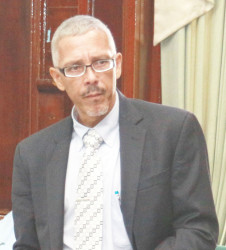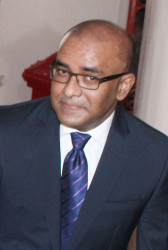A decision by the Guyana Revenue Authority (GRA) to apply previously unimplemented import taxes on a range of hardware and other inputs has left the manufacturing sector warning of dire consequences and Opposi-tion Leader Bharrat Jagdeo yesterday called for a reversal of the decision.
However, Minister of Business, Dominic Gaskin yesterday said that it was not a decision government can undertake by itself as it has legal implications for the country because of obligations within the Caribbean Community (Caricom).
As such, he said Guyana needs to work with Caricom to have a revised list of ineligible items that would see the raw materials needed by this country’s manufacturing sector, which cannot be accessed in the region, struck of the current list.

“The issue is because there are certain items (raw materials) that is on the list of items that is ineligible for tax exemptions under the Revised Treaty of Chaguaramas. GRA cannot issue exemptions for those items and if they do that we would be in violation of the Treaty of Chaguaramas and we would be exposing ourselves to additional legal action and we have already had some judgements against Guyana at the CCJ and this could expose us even more to legal action from businesses around the region who feel that they can manufacture or provide those products from within the region,” Gaskin told Stabroek News yesterday.
“So the solution is if these products are not available in the region then they should not be on that list of ineligible items and some action should be taken at the level of Caricom, through COTED (Caricom Council on Trade and Economic Development), to have them removed from the list of ineligible items,” he added.
What was unanswered yesterday was why only now the import taxes were being applied when they had been mothballed for decades. Reports say the decision to apply the taxes was taken after a local company which manufactures some of the items for which no import taxes were being applied, complained to the government. Why that complaint would lead to a decision that could put a large part of the manufacturing sector under stress was not explained yesterday.
Items in question range from roofing sheets and wire that can be transformed into chain link fencing to cinnamon.
Guyana Manufacturing and Services Association (GM&SA) President Eon Caesar told Stabroek News yesterday that his organisation had been notified that the GRA was now enforcing import taxes on items ineligible for exemption, as outlined in the Caricom founding Treaty of Chaguaramas. The controversy comes at the same time a high-level Caricom meeting was wrapping up here yesterday.
The local manufacturing sector wants a continuation of the GRA tax waivers granted under the former PPP/C administration, until a mechanism is worked out to have a revision of the current agreement.
Enshrined

“Enshrined (in the agreement) was a list of items you cannot import…in April of this year GRA said they will put a stop to the exemptions and you will have to pay import duties,” Caesar explained. There had been no public announcement of this GRA action.
“We have been importing without paying import duties for donkey years…in the interest of not wanting to shut down the manufacturing sector it (the law) wasn’t held up and they continue to issue the concessions to us although in the GRA tax law we have to pay the import duties,” Caesar added.
While the GM&SA president pointed out that as of yesterday there was no report of anyone who paid the newly enforced taxes, he said that a move now in that direction could cripple the manufacturing sector or negatively impact on consumers’ pockets from the increase in prices of products.
“You have a manufacturer who has been, for thirty, forty, twenty years, not paying these duties, it means that the locally manufactured products will no longer be competitive. For small and medium scale manufacturers who cannot make this 40% increase, and implement it into their budget and make it work it will be disastrous. It impacts terribly on the economy, employment and companies as a whole,” Caesar said.
He said that he does not know what mechanism or policies were used by the previous government that saw waivers granted to manufacturers but something needs to be done in the short term as the sector and government plan a strategy for the medium and long-term way forward.
“It needs revision and a long term solution but in the interim we would like government to continue to grant these tax concession that have been granted for a number of years as a short- term basis. Medium term is we ask for a suspension…going through the Council for Trade and Economic Development can take as much as five years but we want something we can work with now,” he said.
“We understand that the law is the law but we would like to make a case to get some relief now,” he added.
Jagdeo, through a press release said he learned of the new enforcement and believes that it was government’s move to bolster dwindling tax revenue.
“The government has gone completely insane. …Rather than address the core reasons for the revenue shortfall which is the precipitous drop in economic activities in the country and the ineptitude in defining a way forward, the government has resorted to targeting the productive sectors of our economy. This ill-advised policy in relation to the manufacturing sector will have dire consequences for those companies and may result in the closure of some of them and the loss of thousands of jobs,” he stated.
“I call on the government to immediately reverse this anti-manufacturing policy,” he added.
‘Blind Eye’

But the Minister of Business said that Jagdeo’s government faltered by not addressing the issue though engaging Caricom about the specific plight of local manufacturers instead of breaking the law. He said that the current system of waivers opens the country to litigation from sister states.
“It should have begun under the last government rather than trying to allow GRA to turn a blind eye to the laws and to our treaty obligations and expose us to all sorts of legal consequences. What they should have done was try to resolve the matter through the mechanisms that allow and are provided…,” he said.
Government will be looking to the local manufacturing industry to provide a list of items that are not available in the region, in the quantities and specifications required. They will also work together to plan a way forward to address the issue, Gaskin told Stabroek News.




